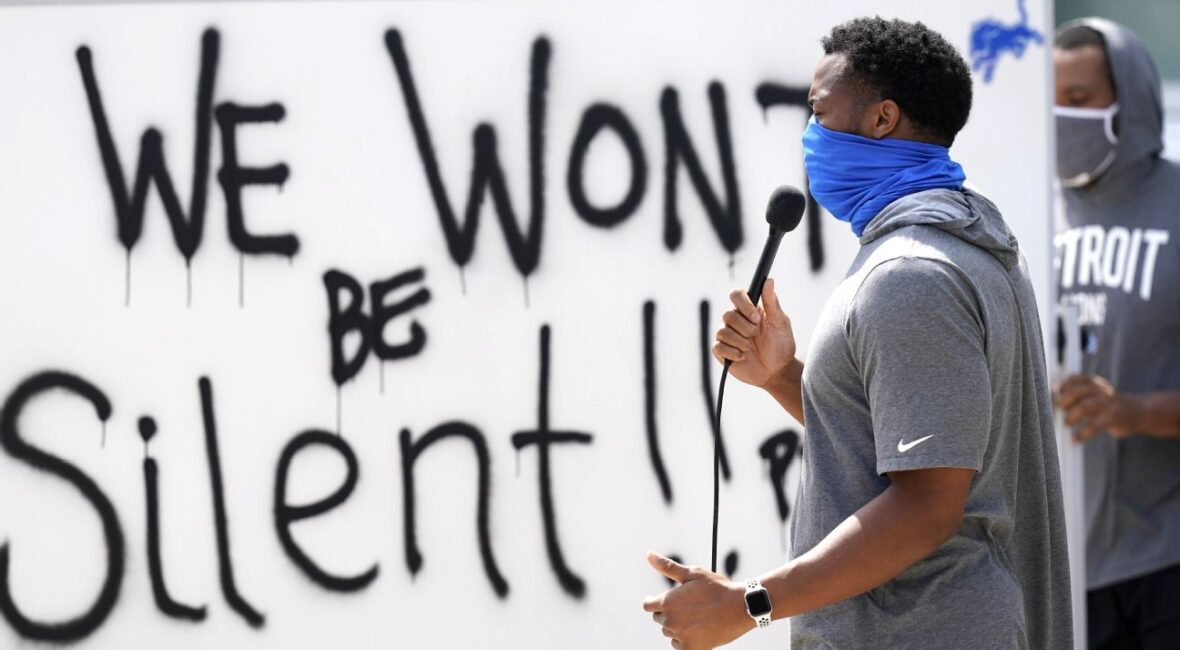The players do have answers for those who would decry the boycotts and ask what they’re actually doing. Cleveland Browns pass-rusher Myles Garrett started a petition that would lead to the criminalization of hate speech. The Tennessee Titans, in their team meetings Thursday, talked about voter registration initiatives, community outreach and setting up meetings with elected officials. Players such as Malcolm Jenkins and Doug Baldwin have been actively working for the past couple of years to get legislation passed to address issues such as prison reform, and in some cases the laws they’ve supported have been enacted.
There are plenty more examples of concrete ideas and real action behind the words and symbols. The protests and the threat of boycotts are designed, at least in part, to get the attention of those who can help the players deliver the change. If the NFL’s owners are concerned about a disruption of their business, then forcing them to confront that disruption is a great way to get their attention.
play
6:36
An emotional Troy Vincent goes in depth on the racial inequalities in the U.S. and how change needs to happen.
“We’re just trying to figure out what we can do to not only bring light to the situation and how it’s wrong, just with police brutality,” Lions safety Duron Harmon told reporters Tuesday after the team’s demonstration, “but how can we, as a team, create change not only amongst ourselves but amongst the community so when things like this happen, we’re speaking on it and putting the pressure on officials to do the right thing and prosecute these officers to the fullest extent.”
In early June, when protests were erupting around the country following the police killings of Floyd, Ahmaud Arbery and Breonna Taylor, several high-profile NFL players, including star quarterbacks Patrick Mahomes and Deshaun Watson, recorded a video calling out the league for inattention to the issues behind the protests. NFL commissioner Roger Goodell recorded his own video the following day, saying a number of the things the players in the first video wanted to hear from the league. Goodell followed that with a series of conversations with the players in the video and other players around the league about off-field issues that were important to them. When the NFL announced in June that it was establishing a new voter education and registration initiative, Goodell said it grew out of those conversations, in which players stressed voting as a key cause they wanted the league’s help in supporting.
That’s just one example — or else, it had better be just one example if the NFL wants to keep its players happy in the ways that are meaningful to them beyond their paychecks and the playing time. NFL players want to know that their league and their teams are behind the causes and issues that they care about. They want support and assistance from their deep-pocketed team owners in helping push the legislative and community reforms they support. They know that pressure from a billionaire team owner might resonate differently with a state legislator or a U.S. senator than even a plea from a star quarterback does, and they feel these issues need all the help they can get.
“We’ve been protecting the shield,” Jets running back Le’Veon Bell tweeted Thursday. “It’s time for the shield to protect us.”
play
1:30
Cowboys coach Mike McCarthy says it’s difficult to talk about football with everything going on in the country. He also offers his support to the Bucks for protesting by not playing.
It didn’t go unnoticed among NFL players that the Milwaukee Bucks spent a portion of Wednesday night talking to Wisconsin state legislators and executives about what could be done to address police reform. That’s the kind of thing NFL players have been doing since four years ago Wednesday, when Colin Kaepernick first sat on the bench during the national anthem in protest of these very same issues. It’s the kind of thing they want to continue to do so that symbolic protests and bottom-line-rattling boycotts don’t represent the extent of their actions on the root issues.
“Are we going to change the world? No, not at all,” New England Patriots cornerback Jason McCourty said Thursday. “This system has been built over hundreds of years, and it’s not going to be a few guys on the Patriots that play football that’s going to embark a change on a system that’s automatically going to go to being equal and fair to everybody. But I do feel like we’ve been blessed and we’ve been placed in the situations we’re in to make a difference. That’s not just chasing Super Bowls. It’s bigger than that. When you realize that, it allows you to continue to move forward and continue to fight for what you feel is right.”
This is the current mindset of the NFL player angry over a repetitive news cycle of police violence against Black people. It’s the same mindset that drove a player-led boycott of NBA playoff games Wednesday. McLeod cited the NBA’s player boycott and indicated that NFL players could “possibly take extreme measures.” So if you don’t think the same thing that happened in the NBA this week can happen in the NFL two weeks from now or two months from now or the week the playoffs are supposed to start, you’re not paying attention. And if the league’s 32 team owners want to make sure it doesn’t, then the best thing they can do is make sure the players and the public know that they are.




